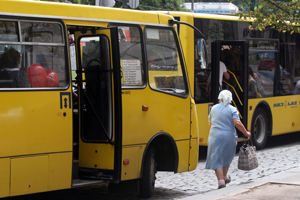An approach to passenger fares

Commuting by car may become more expensive in Ukrainian cities. The first statements about this were voiced in Kyiv. Amending the existing tariffs for passenger transportation in urban passenger transport came up in the resolution of the Kyiv City State Administration (KCSA). The resolution suggested increasing subway fares to two hryvnias which came into effect soon after, starting September 6.
At the same time, a message appeared in the press citing the head of the Kyiv city organization of employers-carriers Capital Valerii Lipetsky, about the carriers’ appeal to the KCSA: they made corresponding calculations to defend the need to raise fares in fixed route taxis to four hryvnias. Are there real reasons for this rise? And when it is to be expected?
There are economic reasons: current fares in many regions do not cover the cost of fuel and wage growth, the president of the Ukrainian Association of Automobile Carriers (UAAC) Vitalii Reva told The Day. “We monitored regions and saw that the difference in fares is about one hryvnia,” he says. According to Reva, it is necessary to raise tariffs by 1-1.5 hryvnias so that the transportation return is at least 15 percent. “Today it is five, eight, or ten percent, depending on the type of transportation,” the president of the UAAC highlighted in his comment to The Day.
But the deputy of the Kyiv Council Dmytro Andriievsky doesn’t have such statistics. Therefore, he is against raising passenger fares without providing the public with clear economic arguments for all the components of the new tariff. “We will request considering the matter during a session of the Kyiv Council, so that deputies get such calculations,” he told The Day. According to Andriievsky, transport fares can remain at current levels due to the effective use of alternative sources of income. In the subway, for example, this refers to advertising activities, says the deputy of the Kyiv Council.
The ex-deputy head of the KCSA Ivan Saliy, who supervised the work of the Main Department of Transport, Communications, and Information, doesn’t see economic reasons to increase transport fares either. The only problem, according to him, is the deficit of budget funds needed to compensate the costs of carriers for transporting preferential categories of passengers. According to Saliy, this requires an allocation from the capital’s budget of about 500-600 million hryvnias for Kyiv Passenger Transportation, and about 300 million for the subway. In addition, it is necessary to “remove the corruption component from route taxi business, then the need for fares increases will disappear,” he said to The Day.
During a recent all-Ukrainian meeting of automobile carriers in Odesa a different solution was found. “If the state does not regulate the price of fuel, but local authorities set the rules, then perhaps there is a need to adopt a single, economically grounded tariff for passenger transportation all over Ukraine, which would be approved by the Ministry of Transportation and Communications of Ukraine, as it was before,” Reva told The Day.
TO THE POINT
Eighty percent of Kyiv fixed route taxis are unprofitable. Valerii Lipetsky announced this during his press conference in Ogliadach Internet newspaper. “Today the profitability of some routes is 3-5 percent, and 80 percent have a zero profitability, 5-7 percent work with losses,” he said. According to Lipetsky, given the length of Kyiv’s routes, the cost of one kilometer per passenger is nine kopecks, while in other cities of Ukraine the figure is about 15-20 kopecks. Lipetsky also added that, given the dire financial situation of carriers, over the last two years the fleet vehicles has not been updated, although 30-40 percent of the buses need to be changed. Answering the question of whether one should expect an increase in fares for route taxi services, he said: “Probably, yes.” However, he stressed that no one is interested in protests and strikes: neither carriers, nor passengers.






